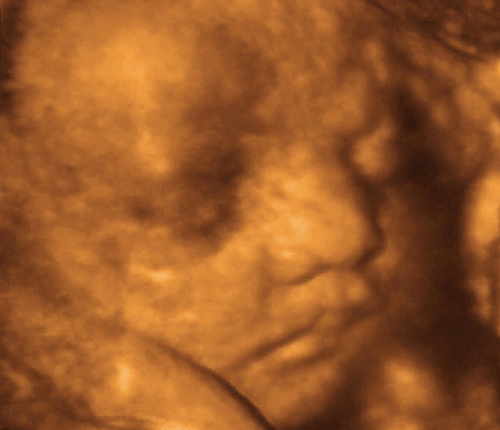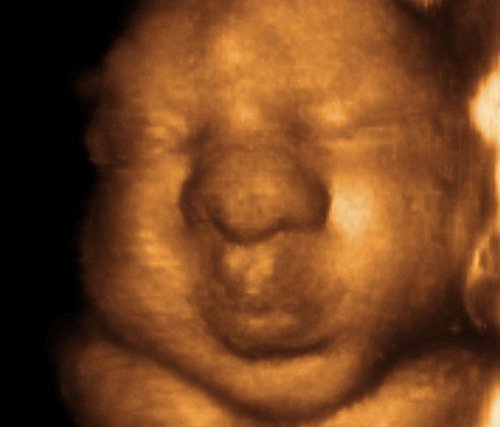You are 35 Weeks and 5 Days 30 days to go…
It’s a good idea to make practical arrangements now for what might happen if you go into labor.
Your baby today
Many babies will still have a good volume of amniotic fluid
around them, but shadows from the placenta or side of the uterus,
coupled with the curled up fetal position, will make imaging the baby
harder and harder.

With only around four weeks to go,
now is the time to make sure you have all your partner’s contact
details and know exactly how to get hold of him in case you go into
labor when he’s at work. He might want to be extra careful to ensure he
has his cell phone switched on and at hand in these final few weeks, and
that he’s not traveling too far away.
If you have other
children or other dependants (pets, for example, a dog) then you should
arrange what will happen to them when you go into the hospital. You may
want to explain to any older children what is going to happen so that
they are prepared for when they go to stay with Grandma, or whoever will
be taking care of them. If you’re having a cesarean, you might also
want your older children taken care of once you’re home from hospital.
Reassure your children
that you will be coming back and that you’re not sick, but that you have
to go to the hospital when the baby comes. Depending on the age of your
children, you could go with them to buy a present for the baby or you
could give them a special job such as opening all the new gifts.
Presents from the newborn to her elder siblings is also a good gesture.
In the lead-up to the birth, ensure your toddler spends time
with any family members who will be taking care of him while you’re in
the hospital. This will help him manage without you without getting
upset.

In one study of women who anticipated that they would not need pain relief, 52 percent actually used it.
According to recent
research from NICE (National Institute for Clinical Excellence), women
underestimate how much giving birth will hurt, and don’t find out enough
about the pain-relief options available .
… Doctor
| Q: |
My baby was premature and is in the neonatal intensive care unit. I’m trying to express milk—am I helping?
|
| A: |
Yes, very much so. Breast milk helps ensure that the mother’s
natural immunity is passed on to her baby via her milk. Since premature
babies are more prone to infection, expressing your breast milk is a
great way to help your baby while she is in the NICU. Breast milk is
much easier for a baby to digest: this is important for premature babies
since their digestive tract may be less developed than a full-term
baby’s.
This is also a great
way for you to bond and develop a relationship with your baby. It’s
likely to be a time of considerable stress for you and you may feel
helpless, so knowing that you’re doing such a great thing to help your
baby will help enormously.
|
You are 35 Weeks and 6 Days 29 days to go…
Complex developments are taking place in your baby’s lungs that will enable her to breathe unaided once she is born.
Your baby today
Most babies will now be positioned longitudinally (lying
straight up and down, with their head well in the pelvis). Even now,
when space is limited in these final weeks, there is still time for the
position to change to head down if your baby is bottom first (breech).

The blood flow to your baby’s lungs
mirrors the development of the airways. Blood leaves the right side of
the heart through a one-way valve into the main pulmonary vein. This
then divides to give a pulmonary branch to each lung, and also a duct
that allows blood to bypass the lungs and travel to the body directly.
This will close soon after birth as the lungs expand and their
resistance to blood flow falls.
Because your baby
doesn’t use his lungs for gas exchange in the uterus, the blood supply
to them is quite small—only 10 percent of the post-birth supply. At this
stage of pregnancy, the lungs’ blood supply has completed its
development, branching into finer and finer vessels as they come to lie
closer to the alveoli.
When your baby is
born, her chest is compressed in the birth canal and this helps to push
the fluid out of the lungs in preparation for that incredible first
breath. If your baby is born by cesarean, she will need first to bring
the fluid up by herself. This is not a problem but for this reason the
first breaths of a baby born by cesarean can be full of mucus.
Items for your hospital bag
Make sure you have all the items you need for your hospital bag.
Remember to include items for yourself as well as the baby and, if you
know you’re having a cesarean, pack enough items for a few days.
Your partner should also get a bag ready for himself and ensure the car seat is installed. Pack snacks and drinks closer to the time, but think about what you might need.
Start figuring out now what you’ll take to the hospital, since you won’t want to be gathering items together once you’re in labor.

For yourself:
For your baby:
Undershirts
Footed onesies
blanket
Diapers
Diaper bags
Cotton pads
Diaper cream, such as Desitin
Baby wipes if you intend to use them
Hat
and cardigan for going home—you can also use the cardigan if your baby
needs layers to keep warm while she’s in the hospital.
Other useful items: